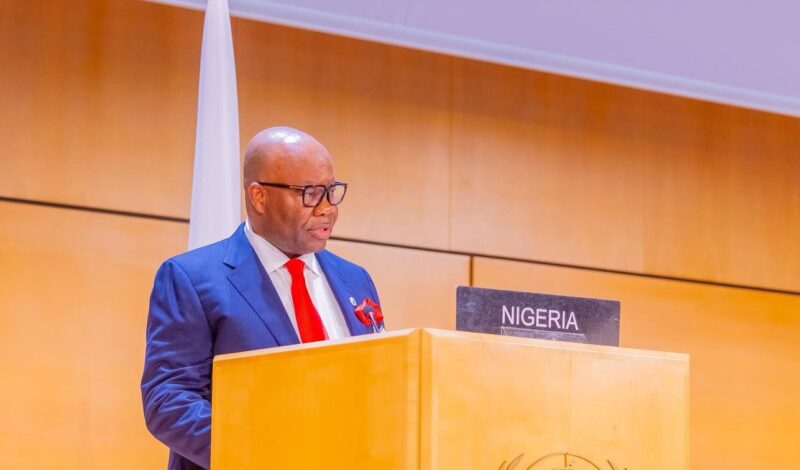The Senate President, Godswill Akpabio, on Tuesday said that state governors no longer need to borrow funds to pay workers’ salaries due to the economic reforms implemented by the President Bola Tinubu’s administration.
Mr Akpabio stated this while addressing lawmakers at the resumption of plenary after a two-month and two-weeks annual recess.
“I can confidently say that through the engineering of President Bola Tinubu and his team, no state government today is borrowing to pay salaries. So, for this, we say kudos to the administration,” he said.
Nigeria has over the years relied heavily on loans from international financial institutions to finance infrastructure projects.
In May, President Tinubu sought the National Assembly’s approval to borrow $21.5 million and ¥15 billion, along with a €65 million grant.
The government claimed the funds will be used to support key infrastructure and security projects, including the expansion of power grids and transmission lines, development of irrigation systems to strengthen food security, installation of a nationwide fibre optics network, procurement of fighter jets to boost national security, and enhancement of rail and road infrastructure across the geopolitical zones.
Similarly, many state governments have, over time, resorted to borrowing to pay workers’ salaries. For instance, Gombe State Governor Muhammadu Yahaya revealed that between 2013 and 2019, the previous administration in the state borrowed about ₦1.3 billion monthly to meet salary obligations.
Under the Central Bank of Nigeria’s (CBN) Salary Bailout Facility (SBF), several states also obtained loans to offset wage arrears.
According to a Nairametrics report, 31 state governments collectively borrowed ₦457.17 billion through the SBF to pay salaries. States such as Imo, Kogi, Kano, Edo, Benue, and Osun were among those listed.
In addition, reports show that between January and June 2023, state governors borrowed about ₦46.17 billion from three commercial banks, Access, Zenith, and Fidelity to pay salaries.
For example, Access Bank recorded an outstanding balance of ₦58.84 billion in state salary bailout facilities as of June 30, 2023, down from ₦101.81 billion in December 2022.
However, since the removal of fuel subsidy, reports indicate that allocations to state governments have tripled in some cases.
President Tinubu has argued that the policy has significantly improved the financial standing of state governments.
Supporting this claim, Kaduna State Governor Uba Sani disclosed that before the subsidy removal in May 2023, the state had to borrow to pay salaries, but it can now meet its wage obligations without borrowing and even operate with a surplus.
The improved revenue has enabled some states to raise workers’ salaries above the ₦70,000 national minimum wage. Lagos and Rivers now pay ₦85,000, while Enugu, Akwa Ibom, Niger, and Bayelsa pay ₦80,000 to their workers.
Condolences to victims
In his address, Mr Akpabio commiserated with victims and families affected by recent tragedies across the country.
“Our country has walked through both shadow and sunshine while we were away. We grieve with the families who lost their loved ones in the cruel boat tragedy on the Niger River in Kogi State, and in the bloody outrage at a mosque in Katsina.
“We mourn also the 12 forest guards slain in Oke-Ode, Kwara State, cut down while protecting our environment — martyrs of service who remind us that insecurity knows no boundaries,” he added.
Mr Akpabio also sympathised with victims of flooding in Bayelsa, Sokoto, Zamfara, and other states.
“We commiserate with our compatriots across the flood-ravaged states of Bayelsa, Sokoto, Zamfara and others, as the 2025 flood season continues to uproot lives and destroy livelihoods.
READ ALSO: Tinubu seeks NASS’ approval for $2.3bn external borrowing
“We urge urgent coordination between the federal and sub-national governments to mitigate these devastations before they become annual calamities. To every home afflicted by these disasters, insecurity, hunger, and hardship, we extend to them the hand of fellowship and the prayer of comfort. We promise them that we shall not flinch from the duty of relief and redress for our people.
“While our hearts grieve, our hopes endure because of glimmers of progress. Nigeria’s oil production has climbed toward 1.8 million barrels per day, driven by reforms and renewed investor confidence. We must ensure that this blessing does not become another fleeting windfall, but a foundation for fiscal discipline, infrastructure renewal, and job creation,” he said.










